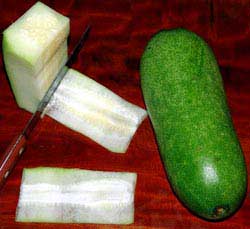Winter Melon is a refreshing, nutritious, and affordable food that is very popular in Vietnam. It is high in water content, low in calories, and contains no fat. Every 500 grams of winter melon contains 8 grams of sugar, 1.5 grams of albumin, 61 mg of vitamin C, and small amounts of calcium, phosphorus, iron, and vitamins B1 and B2.
 |
Winter Melon (Image: nguoivienxu) |
Winter melon contains a high amount of vegetable oil, which is very beneficial for the skin and hair. The seeds, skin, leaves, vines, and flowers of winter melon can all be used for medicinal purposes. Winter melon has diuretic effects, reduces inflammation, and helps with coughs and asthma.
Research shows that the sodium content in winter melon is very low, making it effective in treating conditions such as arteriosclerosis, coronary artery disease, nephritis, edema, hypertension, and obesity. Regular consumption can lead to a slender physique. Additionally, winter melon is effective in detoxifying fish (such as pufferfish, shrimp, and other types of fish), alcohol, and reducing fat accumulation in the body.
Usage: Take fresh winter melon, crush it, and squeeze out the juice, drinking plenty of it. For those with dark spots on the face, mixing winter melon juice with honey and applying it daily will help gradually fade the blemishes. For individuals with a yellowish complexion: take 1 kg of peeled winter melon, cut it into pieces, and mix it with 1.5 liters of rice wine and 1 liter of water.
Then cook it, strain out the residue, and continue to cook until it becomes a thick cream, which can be stored in a jar and used as a night cream. When the skin is darkened, wash the winter melon, peel it, remove the seeds, and either drink the juice or apply it externally to the skin.
KIM NHUNG, compiled



















































